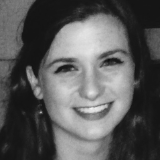The Nostalgic Commercialism of Holiday Time
By Rachael AllenAt 13, I stopped posing for Christmas cards. I finally felt too old to dress up in red and green and stand with my dog on the front steps for a photograph that would be placed on a bookshelf or a mantelpiece or a stack on the kitchen counter in the home of someone too many degrees distanced from me. I flushed at the memory of the prior year’s card: me with splotchy skin and braces and a smile that would make only my dentist pleased.
 The photographs are amusing now, harmless in their display of teenage awkwardness. Like so many annual occasions, the holidays prompt us to realize the passage of time. I think about the graveyard of Christmas trees past that have accumulated in the woods behind our house, the yearly gingerbread house party with our not-so-little-anymore neighbors, the way we no longer secure the Christmas tree to the wall, as we’ve done ever since I tugged on it at age 4.
The photographs are amusing now, harmless in their display of teenage awkwardness. Like so many annual occasions, the holidays prompt us to realize the passage of time. I think about the graveyard of Christmas trees past that have accumulated in the woods behind our house, the yearly gingerbread house party with our not-so-little-anymore neighbors, the way we no longer secure the Christmas tree to the wall, as we’ve done ever since I tugged on it at age 4.
With awareness of time, of course, comes reflection. Holidays demand happiness; we realize more acutely what (or who) does or does not make us happy. Cue the Hallmark movies about the pretty, successful professional in New York City whose loneliness — suddenly realized at the holidays — prompts her to return home to find love in an idyllic, small town where they know exactly how to stage a heartwarming Christmas.
The commercial world, in its holiday costume before the last Thanksgiving leftovers were finished, reminds us of time too: advent calendars tick down the days of the month; sales grow bigger (or louder); renditions of “12 Days of Christmas” annoyingly persist in our minds like the sound of a ticking clock when we can’t fall asleep. Starbucks, for example, keeps its own holiday time too, unveiling not one, but two holiday cups this year. One of them might promote a “gay agenda,” according to a Buzzfeed article and subsequent critiques from a number of conservative outlets. (Holiday controversy is yet another method of marking the passage of time — or showing that nothing has changed. Two years ago, Starbucks was again the center of gossip when Donald Trump criticized the company for abandoning Christmas-themed cups, a move that he felt chose the wrong team: “Happy Holidays” over “Merry Christmas.”)
I came upon an article in The Atlantic about a rather endearing example of holiday time in Farmington, Maine. On the first Sunday of December, an hour north of my college, a town gathered to commemorate Chester Greenwood, the boy who invented earmuffs. Hundreds of earmuff-wearing Mainers attended the town’s parade, which boasted floats and flags and cars covered with earmuffs. For the past 41 years, the town has been observing Chester Greenwood Day in honor of the teenage boy who went ice-skating one morning in December 1873, only to find that his too-large ears were cold. He took action and enlisted his grandmother to help him with his invention.
The author of the article acknowledges the degree to which this celebration relies upon myth. Beloved Chester ultimately patented only a spring inside of earmuffs. (Farmington residents, however, maintain that Chester truly did have big ears.) The town of Farmington — which makes exorbitant sales on earmuffs during the parade — now buys its earmuffs from another state. Perhaps we accept the way myth defines so many of our holiday traditions (as it defines this one), but we cringe at their commercialism.
All of the reminders of time I noted above are born of commercialism — holiday cards and Hallmark and Starbucks hand us a sparkling, caroling Christmas that we, at some point, decided we want. Is that so bad? I loved this article on Chester because of the way the author ends with a rather forgiving perspective of the holiday industry: the parade reminded her of when she was in college, attending the parade for the first time while on a first date. The commercialism, she concludes, was well worth the nostalgia.
This year, perhaps, my Christmas card should be one of the photos my roommates and I took last weekend on my computer’s camera. Ten times more embarrassing than shots of my teenage self, the photo of us reminds me of all the levels of time — past memories of loving the computer’s goofy camera effects in middle school, our present selves smiling within the frame, and the future nostalgia that I know this photo will stir within me next Christmas.
Rachael Allen is a senior at Bowdoin College and a lifelong Canton resident. The recipient of several writing awards, she currently serves as the managing editor for Bowdoin’s student newspaper, the Orient.
Short URL: https://www.thecantoncitizen.com/?p=37774










